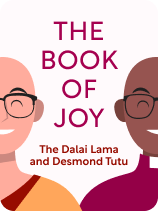

This article is an excerpt from the Shortform book guide to "The Book of Joy" by The Dalai Lama, Desmond Tutu, and Douglas Abrams. Shortform has the world's best summaries and analyses of books you should be reading.
Like this article? Sign up for a free trial here.
Is suffering inevitable? Does everyone experience suffering?
If you ever feel alone when you’re having a tough day, just remember that someone else is also having a bad day. Because The Book of Joy by Desmond Tutu and the Dalai Lama clarifies that suffering is a universal experience that no one can avoid.
Read on to learn why suffering is inevitable, and how you can cope with it.
Suffering Is a Universal Human Experience
According to Tutu and the Dalai Lama, suffering is inevitable and universal. Every person experiences suffering, whether it’s the loss of a loved one or the trauma of war. In response to suffering, we often feel negative emotions like sadness or loneliness. However, recognizing that suffering is inevitable for everybody can be a balm against it because suffering is one of the things that connects us to other people.
(Shortform note: Viktor Frankl, a survivor of a WWII concentration camp and author of Man’s Search for Meaning, explains that suffering is a subjective experience, meaning that there’s no objective measure of suffering. Whether you’ve lost your eyesight or your beloved childhood dog, you’ve suffered. Therefore, you can empathize with anyone’s experience of suffering, regardless of what their suffering looks like, or whether or not it’s the same as yours.)
Sadness
Sadness is often a source of suffering. However, Tutu and the Dalai Lama explain that while sadness and joy may seem like polar opposites, they’re actually inextricably linked. Sadness is often the direct route to empathy and compassion because grief and loss allow you to more clearly see your need and affection for other people. It’s often during periods of sadness or experiences of loss that we reach for one another for comfort or solidarity. Psychologists have found that mild sadness has a number of benefits, including better judgment, increased motivation, and greater generosity and well-being.
(Shortform note: Susan Cain delves into the relationship between joy and sadness in her book Bittersweet. She argues that bittersweetness, the feeling of longing or sorrow, helps us transcend personal and collective pain and build closer relationships with one another. When we refuse to acknowledge sadness, she explains, we run the risk of inadvertently causing harm, further isolating ourselves or others.)
Tutu and the Dalai Lama suggest finding meaning and purpose in your sadness. For example, when a loved one dies, use it as inspiration to be more intentional about living in ways that honor their memory. Grief can also act as a reminder of the richness of love. If you didn’t care deeply for someone, you’d feel nothing when they’re gone. Sadness reveals the depth of our capacity to love
(Shortform note: People living with depression often struggle to find or identify a sense of purpose. Psychologists recommend that if you’re feeling lost, it can help to do something for someone else, however small. For example, do a chore without being asked, call someone to check in, or give a stranger a compliment.)
Loneliness
According to Tutu and the Dalai Lama, sadness and loneliness often go hand in hand. The world is facing an epidemic of loneliness, which is further fueled by a culture of materialism that values production over connection, love, friendship, or community.
(Shortform note: The Covid-19 pandemic exacerbated existing problems of social isolation and loneliness. Although the death tolls declined and many countries lifted their emergency declarations, immunocompromised people have continued to struggle with isolation, even after many of their friends and colleagues transitioned back to normal life.)
Understanding that suffering is universal can empower you to approach people with compassion and openness. Every person experiences suffering; therefore, regardless of a person’s actions, you have the opportunity to feel closer to them by showing compassion for the ways in which they’re suffering.
(Shortform note: If you’re feeling lonely, start with self-compassion. Studies have shown that self-compassion—being kind to yourself—decreases loneliness, while self-judgment and negative self-talk lead to increased feelings of loneliness.)

———End of Preview———
Like what you just read? Read the rest of the world's best book summary and analysis of The Dalai Lama, Desmond Tutu, and Douglas Abrams's "The Book of Joy" at Shortform.
Here's what you'll find in our full The Book of Joy summary:
- Archbishop Desmond Tutu and His Holiness the Dalai Lama's guide to joy
- What joy actually is and why it matters so much
- How to find joy exactly where you are, no matter what your life looks like






